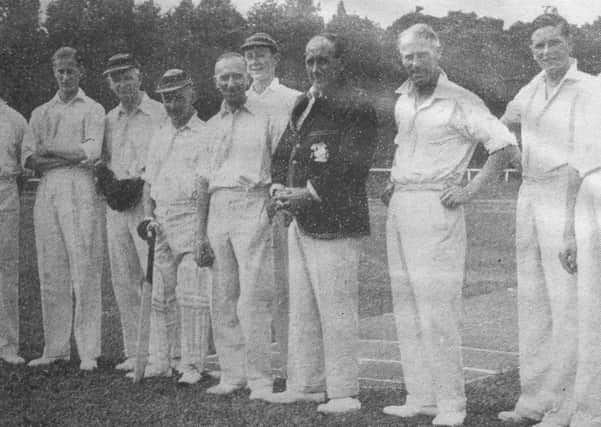Leeds author tells the hidden story of English cricket team who toured Nazi Germany with strict MCC instructions ‘not to lose’


That latter observation is just as well as he devotes many of his waking hours to writing great books, the latest the true story of an English cricket tour of Nazi Germany in 1937.
Dan, who was brought up in Pudsey and is now based in London, and who was once good enough to play representative cricket for Yorkshire, tells the story in Field of Shadows.
Advertisement
Hide AdAdvertisement
Hide AdOne of more than a dozen works of non-fiction to have flowed from his pen, it recounts the tour made by the Gentlemen of Worcestershire to Berlin in 1937.
The tour originated when Felix Menzel, a fanatical cricket lover, persuaded Nazi leaders to invite an English team to play against his modest side of part-time enthusiasts.
This was no idle achievement; Hitler despised cricket, considering it unmanly, after he was introduced to the game during the First World War by British POWs.
But Menzel was persuasive and the Worcestershire Gents, led by former Worcestershire CCC captain Maurice Jewell, who had earlier met the Nazi Minister for Sport during a visit to England, travelled to Germany under strict instruction “not to lose” by MCC.
Advertisement
Hide AdAdvertisement
Hide AdThey obeyed their command to a tee, comfortably winning all three matches while war clouds gathered.
The Gents – today one of the oldest surviving cricket teams in the world, having played their first match back in 1848 – were then a curious mix of minor nobility, ex-county cricketers, rich businessmen and callow schoolboys.
Against a backdrop of Nazi repression, brutality and sporadic gunfire, they battled searing heat, matting pitches and opponents who did not always adhere to the spirit of the game.
The German bowlers were not averse to running out batsmen for backing up too far at the non-striker’s end, while the German captain, Gerhard Thamer, “had a penchant for punching fielders who dropped catches off his bowling”, a tactic unlikely to be used by Alastair Cook.
Advertisement
Hide AdAdvertisement
Hide AdBut relations between the two teams were generally good and during the course of the 10-day trip, politics and tensions temporarily faded as sport became a force for good.
As with the England football team in Berlin a year later, the Gents were obliged to give the Nazi salute before their first match, and Waddell believes they obliged out of politeness.
However, as the tour progressed, and as they developed a better understanding of what was going on around them, their attitude changed.
“If they’d been asked to do that for the final match they wouldn’t have,” said Waddell.
Advertisement
Hide AdAdvertisement
Hide Ad“They refused to have their picture taken with the Reichsportsfuhrer because their unease had grown to such an extent.”
The touring party included Peter Noel Leetham Terry, whose family were Terry’s of York, of chocolate-making fame.
Peter’s father, Noel, had been responsible for revamping the company during the 1920s and opening the art deco chocolate factory on Bishopthorpe Road.
An elegant stroke-maker, Peter went to Marlborough in 1932 and made his first team debut in 1935. He was also a talented golfer, tennis and squash player and a dab hand at bridge too.
Advertisement
Hide AdAdvertisement
Hide AdTerry spent most of the war as a training instructor at Catterick, went to work for the family firm, spent a year as High Sheriff of North Yorkshire and played for the Yorkshire Gentlemen, for whom he was vice-president up to his death in 2006. Other tourists to Germany included Peter Huntington-Whiteley, great-great uncle of model Rosie.
There was even speculation that one of the English players was a spy. Robin Whetherley was a fine cricketer, but he had no connection to Worcestershire or the Gents and even travelled separately to the rest of the players. Waddell believes the English cricket authorities told the Foreign Office about the trip, and that Whetherley, who spoke fluent German, was asked to join the team and gather information to report back to Whitehall.
All the tourists served King and country during the war and, perhaps out of embarrassment, rarely spoke about the tour afterwards. But Waddell, whose account is superbly written and exhaustively researched, managed to uncover a scrapbook put together by one of the players which enabled him to piece together a fascinating tale.
Field of Shadows: The Remarkable True Story of the English Cricket Tour of Nazi Germany 1937, by Dan Waddell, is published by Bantam Press, priced £16.99.